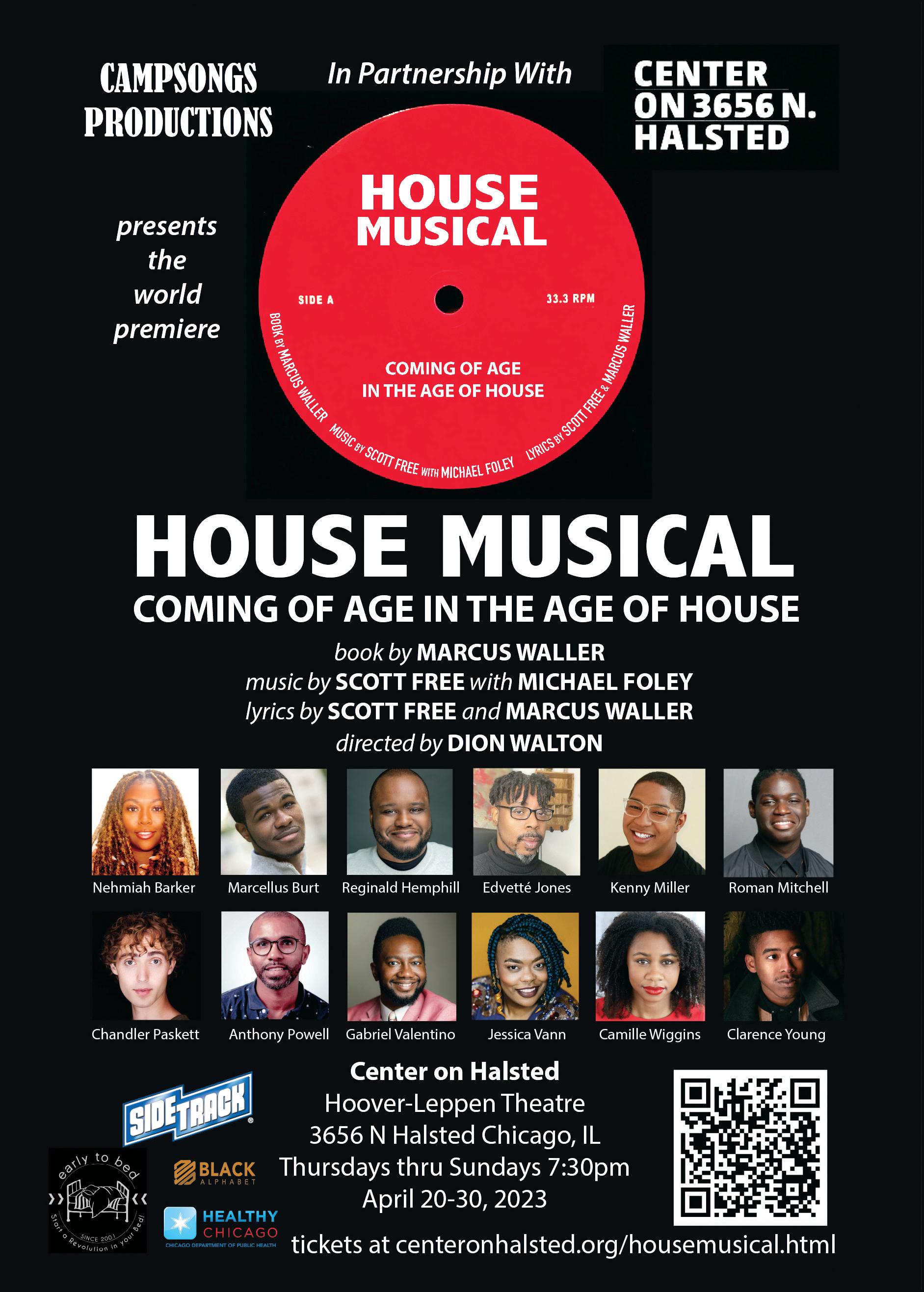
5 minute read
boiMAG.com "House Musical"
Coming Of Age In The Age Of House
INTERVIEW WITH SCOTT FREE
Advertisement
Q: Hello Scott, Campsongs Productions has a “House Musical” theater production getting ready to hit the stage at the Center on Halsted, can you tell us where the idea came from and where the desire to put on a house musical came from?
A: Many years ago, I came up with the idea to have a musical about House Music, one because I lived through the era, but two, I’m one of those people who takes every idea and thinks, “could that be a musical?”. I knew I had a good idea, and then, when I came up with the title, House Musical, I knew I had something big! The problem was, I had no plot - oops! So I was hanging out with my friend Marcus Waller, who I knew from the House days. We actually met at the Generator, one of the black gay clubs of the House era. He told me that how going to the Warehouse helped him to come out of the closet, because he had never met any gay people before going to that club. He said the Warehouse gave him the freedom to be himself. When he told me that, I thought, “bingo! we’ve got it!”. The amazing thing to me is how, when we talk to folks of that age who grew up on the south side, they all say the same thing, “the Warehouse is how I came out of the closet”.
The Warehouse deserves a place in the black LGBT history of Chicago, along with its place in Chicago music history. I know that right now, Preservation Chicago is fighting to save the building, which is in danger of being demolished by developers.
Q: Since there are a couple origins of house music, one beginning with the DJs playing classic disco records, like at the Warehouse club in Chicago, and other with DJs developing the Chicago house sound with drum machines, bass lines, samples and vocals, so where does the setting of the “House Musical” take place?
A: Yes, House Music as we know it took awhile to develop, as does any popular music genre in American history. We definitely compressed that time for the sake of the musical, so as we say about movies, “It’s not a documentary!”. So those who know the full history will see a time warp, when Dwayne, the main character, enters the Warehouse, it’s around 1978, when he leaves that morning, it’s 1986!
We wanted to include all of the important black LGBT clubs of the era, including the Warehouse, Stop & Drink, Generator, Rialto Tap, and Club LaRay, they're all in there!
Q: Tell us something about the book that the musical was inspired from.
A: Once I had the plot for the musical, I had to beg Marcus to write the book! However, Marcus made a good point. He told me that the name I had was not sufficient, because this really was a personal story, and not the history of House. So I came up with the full title, being ‘House Musical, Coming of Age in the Age of House’, which is a much better description of the show you will see.

The book is actually the combining of two stories. The main story is from Marcus, and it is autobiographical. A lot of the struggles that Marcus has gone through in his life are in this play. The part I bring to the musical is the story of my friend Riley Evans, who got me involved in making House music records. He introduced me to Frankie Knuckles, Larry Heard, and Brett Wilcots, of Gherkin Records. We present Riley’s story in the musical, and as a tribute, we keep the name Riley for the character.
Q: What do you think that the house music movement and message was about, and why is that still of interest to us today?
A: I have done a whole lot of thinking about House Music and its power. I knew that the most essential part of House Music was its tempo, 120 beats per minute. When I realized that that's the beating speed of a healthy heart, it all came together for me. House Music is a deep, human, emotional, spiritual thing, a joyful celebration of life itself!
Q: What's the audience “takeaway” that you'd like to inspire after seeing the House Musical?
A: Wow, there are so many things we are trying to bring to the audience with House Musical. From the musician’s side, I describe the House Music era as being like Beatlemania, there was this constant buzz of excitement in the air. Chicago musicians, DJs and producers were making records that got played on the two major R&B radio stations in Chicago, WBMX and WGCI, and those records were becoming hits in Europe. The excitement came from the music itself, but also from the knowledge that we were smack dab in the middle of history. We knew what was being created would someday be recognized as it is being recognized today.
We are also trying to take folks back to the late 70’s/early 80’s, which was such a different time for LGBT folks than it is today. There were no out Hollywood celebrities, no gay-themed TV shows. No one was out at their job, most people were not out to their families. On top of that, there was the huge dark cloud of AIDS that was hovering over all of us, knowing that AIDS was a death sentence, and yet fighting and staying positive, and celebrating our proud LGBT-selves through it all!

Advertising: boiads@aol.com





